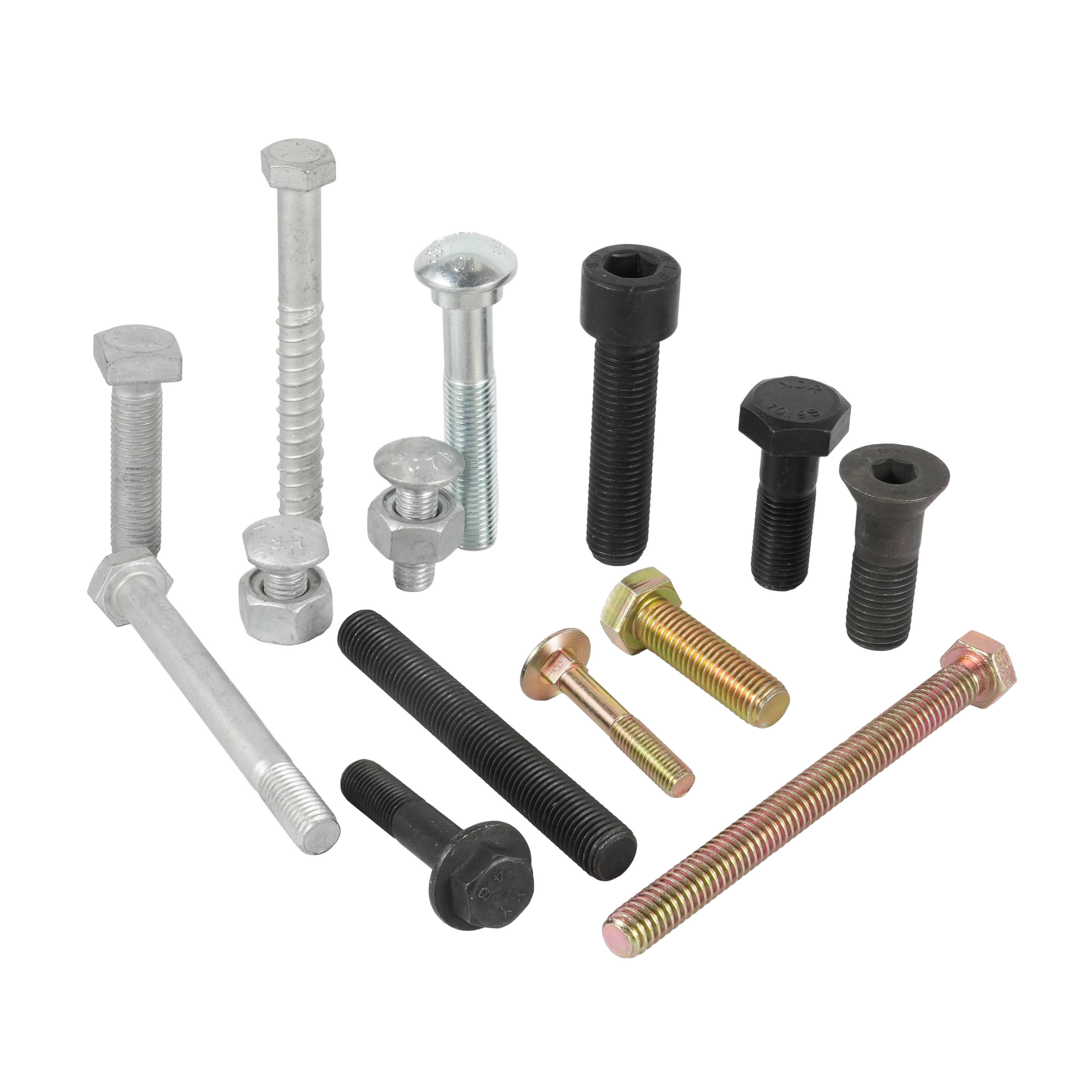Sənaye Birləşdirici Həllərində Kritik Fərqləri Anlamaq
Sənaye birləşdiricilərinin dünyasında, istifadəyə hazır vintlər və ya müştəriyə xas vintlər arasındakı seçim layihənin uğuruna ciddi təsir edə bilər. Ümumi tətbiqlər üçün istifadəyə hazır vintlər çox hallarda kifayət qədər effektiv olsa da, xüsusi vintlər performansı, möhkəmliyi və ümumi layihə nəticələrini artırmağa imkan verən fərdi həllər təklif edir. Bu ətraflı bələdçi bu vacib birləşdirici komponentlər arasında seçim etmək üçün əsas fərqləri, tətbiq sahələrini və nəzərə alınmalı məsələləri araşdırır.
Xüsusi Hazırlanmışın Mühəndisliyi بولت İstehsalat
İrəliləmiş İstehsal Prosesləri
Xüsusi vintlər dəqiq spesifikasiyaları və yüksək keyfiyyəti təmin edən ən yeni texnologiyalardan istifadə edərək istehsal olunur. Bu proseslər tez-tez kompüterdə dizayn (CAD) sistemlərini, inkişaf etmiş CNC emalını və ciddi keyfiyyət nəzarət tədbirlərini əhatə edir. Kütləvi şəkildə istehsal olunan standart vintlərdən fərqli olaraq, xüsusi vintlər unikal material seçimlərini, mürəkkəb həndəsi formaları və xüsusi səth emalını nəzərə almağa imkan verən ixtisaslaşmış istehsal metodlarından keçir.
İstehsalat prosesi adətən materialın seçilməsi ilə başlayır, burada mühəndislər təyinatına uyğun olaraq metallar və ərintilərin geniş çeşidindən seçim edirlər. Bu yüksək möhkəmlikli polad ərintiləri, paslanmayan polad növləri və ya titan və İnkonel kimi ekzotik materialları daxil edə bilər. Seçilmiş material layihə tələblərinə uyğun ölçüləri, rezba nümunələrini və baş dizaynlarını əldə etmək üçün diqqətlə emal olunur.
Keyfiyyət Nəzarəti və Sinqlama
Xüsusi boltlar performans xarakteristikalarını yoxlamaq üçün ciddi test protokollarından keçir. Bu, ölçülərin yoxlanılması, materialın tərkibinin analizi və mexaniki xassələrin test edilməsini əhatə edir. Hər bir partiyaya adətən material sertifikatları, test hesabatları və uyğunluq bəyanatları ilə birlikdə ətraflı sənədlər verilir. Keyfiyyətin təminatı bu səviyyəsi standart boltlar üçün adətən mövcud olandan üstün olur.
Xüsusi boltpin istehsal edən istehsalat müəssisələri tez-tez ixtisaslaşmış test avadanlıqlarına malik olur və sertifikatlı keyfiyyət nəzarəti əməkdaşlarını işə götürürlər. Bu, kritik tətbiqlər üçün hər bir birləşdirmə elementinin müəyyən edilmiş tələbləri yerinə yetirməsini və ya onu üstələməsini təmin edir ki, bu da uğursuzluğun mümkün olmadığı hallarda əminlik hissi yaradır.
Tətbiqlər və Sənayedə İstifadə
Xüsusi Sənaye Tətbiqləri
Standart birləşdirmə elementlərinin konkret tələbləri ödəyə bilmədiyi sənayelərdə xüsusi boltpinlər geniş istifadə olunur. Məsələn, kosmik sənayedə ekstremal temperatur və gərginliyə dözəcək, eyni zamanda minimal çəki saxlayacaq şəkildə hazırlanmış xüsusi boltpinlərə tez-tez ehtiyac duyulur. Eynilə, dəniz sənayesi də tez-tez korroziyaya davamlı və qətliyyat şəraitində struktur bütövlüyünü saxlaya biləcək xüsusi birləşdirmə elementlərinə ehtiyac duyur.
Təmir maşınlarında və tikinti avadanlıqlarında xüsusi boltlar tez-tez yüngü daşıyan tətbiqlərdə kritik komponentlər kimi işləyir. Bu xüsusi hazırlanmış birləşdirmə elementləri standart boltların effektiv şəkildə həll edə bilmədiyi unikal yüklənmə naxışlarını, vibrasiya şəraitini və məkan məhdudiyyətlərini nəzərə ala bilir.
Memarlıq və Dizayn Tətbiqləri
Sənaye tətbiqlərindən kənarin, xüsusi boltlar memarlıq layihələrində və ixtisaslaşmış dizayn tətbiqlərində də vacib rol oynayırlar. Memarlar və dizaynerlər tez-tez funksional və estetik məqsədlərə çatmaq üçün xüsusi birləşdiriciləri göstərir. Bunlara dekorativ baş dizaynları, unikal örtük növləri və ya ümumi vizual cazibəyə töhfə verən eyni zamanda konstruktiv möhkəmliyi qoruyan konkret ölçülər tələbləri daxil ola bilər.
Dəqiq spesifikasiyalara malik fərdi boltlar yaratmaq qabiliyyəti standart birləşdirmə elementləri ilə mümkün olmayan inkişaf etmiş memarlıq həllərinin yaradılmasına imkan verir. Bu çeviklik dizaynerlərə təhlükəsizliyi və davamlılığı təmin edərkən yaradıcı sərhədləri irəli çəkməyə imkan verir.
Xərclərə dair nəzərdən keçirmə və iqtisadi amillər
İlkin Investisiya Analizi
Fərdi boltlar adətən standart alternativlərlə müqayisədə daha yüksək başlanğıc investisiya tələb etsə də, uzunmüddətli faydalar tez-tez xərcləri əhatə edir. İlkin qiymətləndirmə xüsusi istehsal proseslərini, material seçimi və keyfiyyət nəzarəti tədbirlərini əks etdirir. Lakin sahiblik üzrə ümumi xərclər nəzərə alındıqda, fərdi boltlar təmir tələblərini azaldaraq və iş vaxtını uzadaraq daha sərfəli ola bilər.
Təşkilatlar investisiya qərarı verərkən istehsal həcmi, tətbiqin əhəmiyyəti və mümkün nasazlıq xərcləri kimi amilləri qiymətləndirməlidir. Bir çox hallarda, xüsusi boltpirlərin ödənilən əlavə haqqı yaxşılaşmış performans və dəyişdirmə tezliyinin azalması hesabına kompensasiya edilir.
Uzunmüddətli Dəyər Təklifi
Xüsusi boltpirlərin dəyər təklifi yalnız xərc nəzərdə tutmaqla məhdudlaşmır. Bu ixtisaslaşmış birləşdiricilər tez-tez sistemin etibarlılığının artırılmasına, texniki xidmətin səmərəliliyinin yaxşılaşmasına və dayanma müddətinin qısalmasına töhfə verir. Kritik tətbiqlərdə dəqiq tələblərin müəyyənləşdirilməsi bahalı nasazlıqları qarşısını ala və nəzərdə tutulan xidmət müddəti ərzində optimal performansı təmin edə bilər.
Həmçinin, xüsusi boltpirlər bir neçə standart variantın ehtiyatda saxlanılması ehtiyacını aradan qaldıraraq inventar idarəetməsini asanlaşdıra bilər. Bu sadələşdirilmiş yanaşma ehtiyat daşıma xərclərində əhəmiyyətli xərc qənaətinə və inzibati yükün azalmasına səbəb ola bilər.
Dizayn Nəzərdən Keçirilmələri və Spesifikasiyalar
Material Seçimi Kriteriyaları
Xüsusi boltpin üçün doğru materialın seçilməsi iş şəraiti, yük şəraiti və kimyəvi təsirlər daxil olmaqla müxtəlif amillərin diqqətlə qiymətləndirilməsini tələb edir. Mühəndislər uzanma möhkəmliyi, akma həddi, korroziyaya davamlılıq və temperatur sabitliyi kimi xüsusiyyətləri qiymətləndirməlidirlər. Dəqiq material tərkibinin göstərilə bilməsi çətin tətbiqlərdə optimal performansı təmin edir.
Yüksək temperaturlu işlər, son dərəcə korroziyaedici mühitlər və ya qeyri-maqnit xassə tələb edən tətbiqlər kimi xüsusi problemlərin həll edilməsi üçün inkişaf etmiş materiallar və ərintilər seçilə bilər. Bu səviyyədə fərdiləşdirmə birləşdirici detalın cari tələbləri və uzunmüddətli performans gözləntilərini ödəməsini təmin edir.
Həndəsi və Ölçü Tələbləri
Xüsusi tətbiqlər üçün fərdi boltların həndəsi dizaynı gərginlik paylanmasının, montaj tələblərinin və yer məhdudiyyətlərinin nəzərə alınması ilə optimallaşdırıla bilər. Mühəndislər performansı artırmaq və quraşdırmayı asanlaşdırmaq üçün fərdi rezba formalarını, baş dizaynlarını və şaft konfiqurasiyalarını təyin edə bilərlər. Dizaynda bu çeviklik standart boltlar təqdim edə bilməyəcək həllər imkanı verir.
Ölçü dəqiqliyi xüsusilə dəqiq toleransların saxlanması tələb olunan tətbiqlərdə çox vacibdir. Fərdi boltlar kompleks toplanmalarda düzgün oturma və funksiya təmin etmək üçün dəqiq spesifikasiyalara uyğun istehsal edilə bilər.
TEZ TEZ VERİLƏN SORĞULAR
Fərdi boltların istehsalı nə qədər vaxt alır?
Fərdi boltların istehsal müddəti adətən mürəkkəblik, miqdar və material mövcudluğundan asılı olaraq 2-6 həftə arasında dəyişir. Kritik tətbiqlər üçün sürətli sifarişlər qəbul edilə bilər, lakin bu, tez-tez əlavə xərclərə səbəb olur.
Fərdi bolt istehsalı üçün minimum sifariş miqdarları nə qədərdir?
Minimum sifariş miqdarı istehsalçılardan və dizaynın mürəkkəbliyindən asılı olaraq dəyişir. Bəzi istehsalçılar 100 ədəd kimi aşağı sifarişləri qəbul edə bilərsə də, daha mürəkkəb dizaynlar və ya xüsusi materiallar təchizat xərclərini ödəmək üçün daha yüksək minimumlar tələb edə bilər.
Fərdi boltlar həmişə standart boltlardan daha bahalıdır?
Xüsusi boltların vahid dəyəri adətən standart boltlardan daha yüksək olsa da, xidmət ömrü, təmir xərclərinin azalması və yaxşı performans kimi amilləri nəzərə aldıqda ümumi sahiblik dəyəri daha aşağı ola bilər. Həqiqi dəyər fərqi isə material seçimi, mürəkkəblik və sifariş həcmi kimi amillərdən asılıdır.

